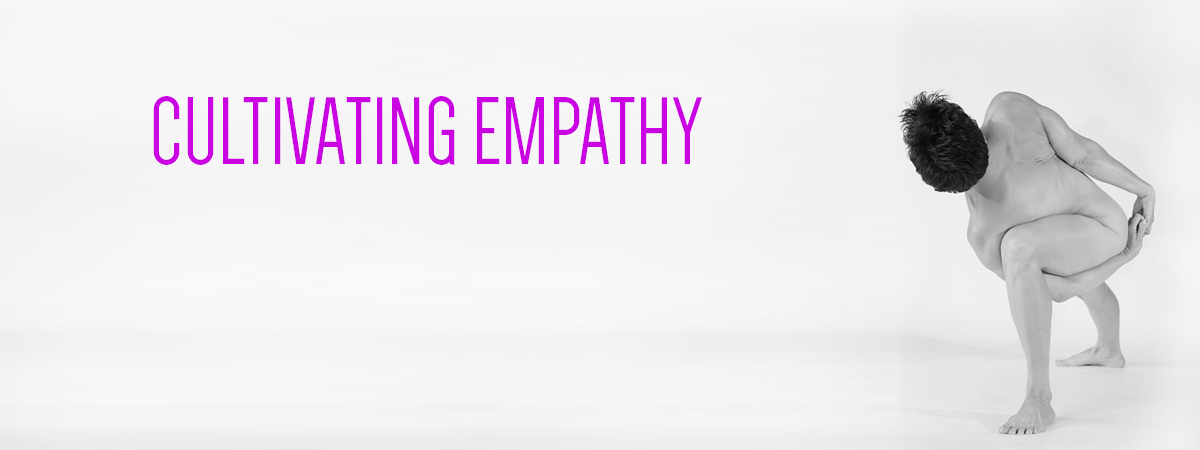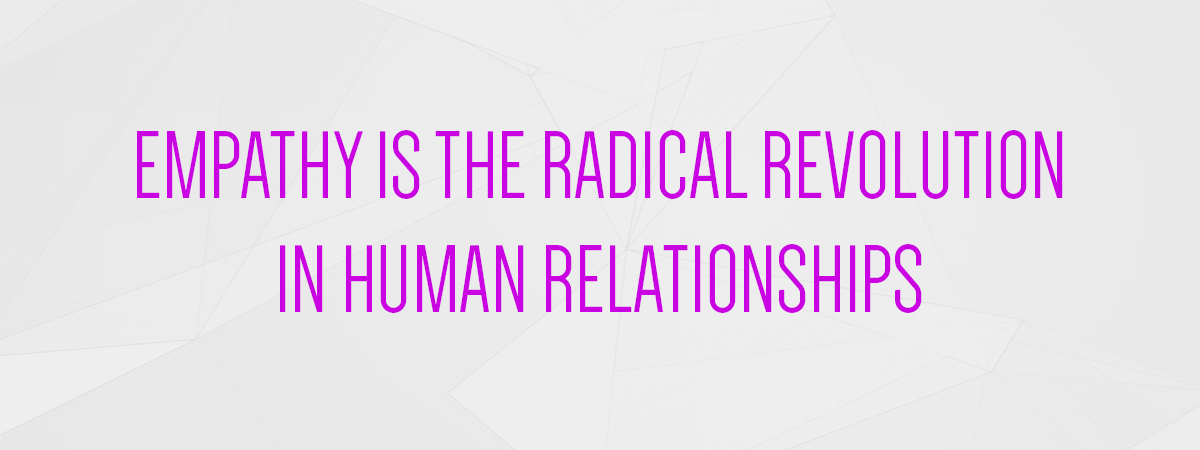
 Empathy seems to be on the tip of the tongue of every scientist and business leader everywhere and according to the latest research, it is something we should be cultivating to improve the quality of our lives. But what is empathy?
Empathy seems to be on the tip of the tongue of every scientist and business leader everywhere and according to the latest research, it is something we should be cultivating to improve the quality of our lives. But what is empathy?
As human beings we are social creatures who want to understand the people we are interacting with on a daily basis and we also want to be understood. Empathy is the ability to walk a mile in someone else’s shoes, understanding what they are feeling and what their perspectives are and use that understanding to impact our own actions.
Whether we are showing it or receiving it, empathy helps us to function more effectively in our relationships and allows us to happily live alongside each other. The benefits of empathy are vast and we know that empathetic people have more meaningful and satisfying relationships and function better in the workplace. We also know that empathy seems to be decreasing.
We all do better when we give and receive empathy and the lack of empathy can have a huge impact on everyone. While we all start from a different baseline capacity for empathy, there are certain ways to cultivate it. Here are our TOP 10 ways to nurture empathy and increase our understanding of others.

#1 Cultivate Curiosity About Others
People who are highly empathetic have insatiable curiosity about others. They have maintained the natural curiosity we were born with but that society tries to beat out of us and they find other people extremely interesting. Keep in mind, this quality of being an interested inquirer has nothing to do with interrogating others. It’s about a genuine interest to find out what makes the other person tick and to understand the world inside the heads of others. Curiosity has the ability to broaden empathy beyond our circle of friends and seeks to encounter world views that are different from our own.
#2 Be Non-Judgmental
Cultivating empathy means that we create a judgment-free environment because judgment creates a barrier that makes it impossible to tune into the emotions, feelings, thoughts and experiences of others. Listen without forming a judgment so you can get all the information you need and give the other person the benefit of the doubt. Remember, we all have to deal with some issues in our lives and simply try to do our best, so don’t judge and bring someone else down, but be open to understand another person’s point of view and situation.
#3 Become an Active Listener
To become more empathetic, it is essential to acquire the art of active listening. Listen to every single word the other person is saying, imagine the emotions and feelings that drive what is being said and feed back what you hear to the person who is speaking. Active listening means that we truly tune in to the other person, which in turn leads to a much deeper connection and more meaningful and satisfying relationships. Be present in your interactions and open up to the unique emotional state and needs the other person is experiencing in this very moment.
#4 Spend Time Helping Others
There is a reason why you feel lighter and happier after you help someone out. Research shows that people who volunteer on a regular basis increase their level of empathy and being more empathetic increases life satisfaction. For a highly empathetic person it is important to create social bonds outside of their immediate social circle and the well-being of others is always at the forefront of their thinking. It doesn’t really matter how you go about helping others, whether you volunteer at a soup kitchen, mentor kids or organize a fundraiser, reach out to people you know need your help and those altruistic actions will increase your level of empathy.

#5 Indulge in Fiction
A fascinating Dutch study revealed that people who allow their minds to wander around in the fictional world of written stories generally tend to be more empathetic. When you get lost in a story, you experience a change in ideas, attitudes and behaviors that reflect the perspective from the story. It’s like working out our imagination muscle and the more we really dive into a work of fiction and become absorbed in it, the more we can increase our empathy, because we can imagine ourselves in the position of another person.
#6 Use Body Language
Becoming more empathetic and an active listener requires the important tool of body language. The way you position your body, your gestures and holding eye contact can all be very useful to show the other person that you are engaged in their story. Assure the person that you are focused on them rather than your smart phone or any other gadget by maintaining eye contact, make sure that you turn your body towards them and mirror their body language so that the other person knows that what they are saying is important and relevant. Keep in mind though that there are cultural differences and certain body movements can have different meaning, depending on who you are talking to.
#7 Ask Questions
Everybody likes to feel important and wants to share their story, so make it a point to ask open questions so that the other person is encouraged to open up. Listen to what the other person just said and rather than giving your opinion, ask meaningful questions that dive deeper into the subject. Besides opening up the other person, it also shows interest in the other person and acknowledges the other person’s feelings.
#8 Be Comfortable with Silence
Most people find silence uncomfortable, however, learning how to be comfortable with silence is an important tool in nurturing empathy. Sometimes you can get caught in a situation where it is difficult to continue your conversation and allowing silence creates the space the other person may need to think and continue. Yes, it can feel awkward, especially since our society is so focused on distractions, noise and speed, but if you can explore the use of silence, you can improve a difficult situation and make it more productive and healthy.
#9 Show Emotional Support
Whenever someone tells you a personal story that involves a difficult situation or problem, it is very likely that he or she doesn’t feel good and needs your emotional support to get through the situation. Show concern and care about the other person’s emotional state. Ask how they are feeling and offer help, if there is anything you can do. Sometimes all the other person may need is to talk it through and offering to meet and listen can make all the difference. And don’t forget to give the person a hug, as touch releases the feel-good hormone oxytocin that will help you to feel more connected and shows emotional support.
#10 Put Yourself in Someone Else’s Shoes
It’s easy for us to judge a situation or person when we only see our point of view. Walk a mile in another person’s shoes and see the situation from their perspective. Maybe they are experiencing major problems in a different area of their lives and undergo immense pain and difficulty. Get to know all the details about the other person’s problem before coming to a conclusion. Imagine you are that person. Imagine going through this particular problem right now. Try to understand the other person’s perspective. This way you can connect with their perspective and emotional state a lot better and develop a greater sense of compassion and empathy.
Empathy requires us to actively connect with another person’s emotional experience, which leaves us vulnerable to the effects of our own emotions. Be genuinely interested in what others feel, think and experience and open yourself up to see the world from a multitude of perspectives. It’s a gift that keeps on giving and you will improve your quality of life as well as the quality of life of everyone around you.
EMPATHY IS THE RADICAL REVOLUTION IN HUMAN RELATIONSHIPS
Joschi & Monika
#BoldNaked
